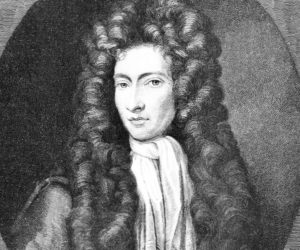
The scientific contributions of Robert Boyle (1627 – 1691) cover a variety of subjects including physics, hydrostatics, and the earth sciences, however he is best known for his contributions to the field of chemistry. Through his efforts, his work helped to break away the scientific world from alchemy and to usher in modern chemistry.
Born in Ireland to a wealthy family, Boyle attended a private boarding school at the age of eight, followed by a tour of the European continent with his French tutor that ended in Italy at the time when the great Galileo died. This experience had a profound impact on Boyle and when he returned to England where he hooked up with other like-minded individuals to form the “invisible college” where they met, often at Gresham College, and was to be the precursor of the Royal Society of London.
At the same time Boyle hired Robert Hooke as his assistant. The two like-minded men collaborated on many discoveries including Boyle’s Law, which states that pressure and volume of gas have an inverse relationship at a fixed temperature.
The publication of The Sceptical Chymist in 1661 which is considered by many as the beginning of modern chemistry. The book is composed as a dialogue and in it he rejects the ideas of Aristotelian elements of earth, fire, wind, and water and suggests the idea that matter consists of atoms in motion and that every phenomenon is the result of the collisions of these particles.